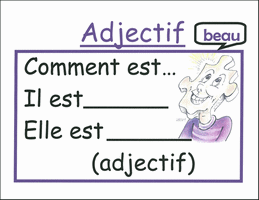dimanche 16 décembre 2012
samedi 15 décembre 2012
How to say, I have ... (J'ai ...)
I have a book = J'ai un livre.
I have a brother = J'ai un frère.
You have a beautiful cat = Tu as un joli chat or Vous avez un joli chat.
He has a big dog = Il a un gros chien.
We have a small house = Nous avons une petite maison.
Note:
You say, tu (you) to a friend.
For someone older (parents, teacher, someone you show respect) or if there are many people, you say, vous.
How to tally
Let's find out the favourite activity of the students in our classroom.
We make a table with a column for each activity. Then we tally the results in the columns. Finally, we represent the results in a Bar-Chart (Diagramme à colonnes)
Parents: Can you help your child do another survey fo find out the favourite food in your family (ask dad, mom, sisters, brothers, grandpa, grandma, uncles, aunts, cousins, etc.) and represent the results in a chart?
dimanche 9 décembre 2012
Adjectives - How to pronounce them
|
Masculin (male) |
Feminine (female) |
|
|
grand |
grand e |
big |
|
petit |
petit e |
small |
|
fort |
fort e |
strong |
|
faible |
faible |
weak |
|
gros |
gros se |
fat |
|
maigre |
maigre |
slim |
|
jeune |
jeune |
young |
|
vieux |
vieille |
old |
|
bon |
bon ne |
good |
|
mauvais |
mauvais e |
bad |
|
gentil |
gentil le |
nice (human) |
|
méchant |
méchant e |
mean |
|
beau |
belle |
handsome (beautiful) |
|
joli |
joli e |
pretty |
|
vilain |
vilain e |
ugly |
|
laid |
laid e |
ugly |
|
amusant |
amusant e |
fun |
|
intéressant |
intéressant e |
interesting |
|
ennuyant |
ennuyant e |
boring |
|
content |
content e |
happy |
|
heureux |
heureu se |
happy |
|
fâché |
fâché e |
upset |
|
malheureux |
malheureu se |
unhappy |
|
triste |
triste |
sad |
|
excité |
excité e |
excited |
|
excitant |
excitant e |
exciting |
|
chaud |
chaud e |
hot |
|
froid |
froid e |
cold |
|
rapide |
rapide |
fast |
|
lent |
lent e |
slow |
|
épais |
épais se |
thick |
|
mince |
mince |
thin |
|
riche |
riche |
rich |
|
pauvre |
pauvre |
poor |
|
fatigant |
fatigant e |
tiresome |
|
mignon |
mignon ne |
cute |
Systèmes de vie (Life systems)
Est-ce que les animaux et les plantes sont importantS? Pourquoi?
Are animals and plants important? Why?
Animals, plants, human beings and the environment are all connected to one another. One affects the other.
If there are no animals, we may not have food (e.g., meat, milk, cheese, eggs,... )
If there are no plants, we may not have food and air (e.g., vegetables, fruits, grains, honey, ...)
Plants produces oxygen, which living things need to breathe.
Animals need other animals, insects and plants to survive.
Il faut prendre soin de animaux, de plantes et l'environnement.
So we need to take care of animals, plants and environment.
How can we do that?
By treating and feeding animals well.
By growing our own vegetables.
By not wasting food and water.
By recycling and composting so that we can minimize waste.
Can you make some more suggestions?
vendredi 7 décembre 2012
Les adjectifs (The adjectives)
Adjectives are very important. In French, the adjectives often change slightly for female subject. Most of the time, an "e" is simply added to it.
|
Masculin (male) |
Feminine (female) |
|
|
big |
grand |
grand e |
|
small |
petit |
petit e |
|
strong |
fort |
fort e |
|
weak |
faible |
faible |
|
fat |
gros |
gros se |
|
slim |
maigre |
maigre |
|
young |
jeune |
jeune |
|
old |
vieux |
vieille |
|
good |
bon |
bon ne |
|
bad |
mauvais |
mauvais e |
|
nice (human) |
gentil |
gentil le |
|
mean |
méchant |
méchant e |
|
handsome (beautiful) |
beau |
belle |
|
pretty |
joli |
joli e |
|
ugly |
vilain |
vilain e |
|
ugly |
laid |
laid e |
|
fun |
amusant |
amusant e |
|
interesting |
intéressant |
intéressant e |
|
boring |
ennuyant |
ennuyant e |
|
happy |
content |
content e |
|
happy |
heureux |
heureu se |
|
upset |
fâché |
fâché e |
|
unhappy |
malheureux |
malheureu se |
|
sad |
triste |
triste |
|
excited |
excité |
excité e |
|
exciting |
excitant |
excitant e |
|
hot |
chaud |
chaud e |
|
cold |
froid |
froid e |
|
fast |
rapide |
rapide |
|
slow |
lent |
lent e |
|
thick |
épais |
épais se |
|
thin |
mince |
mince |
|
rich |
riche |
riche |
|
poor |
pauvre |
pauvre |
|
tiresome |
fatigant |
fatigant e |
|
cute |
mignon |
mignon ne |




